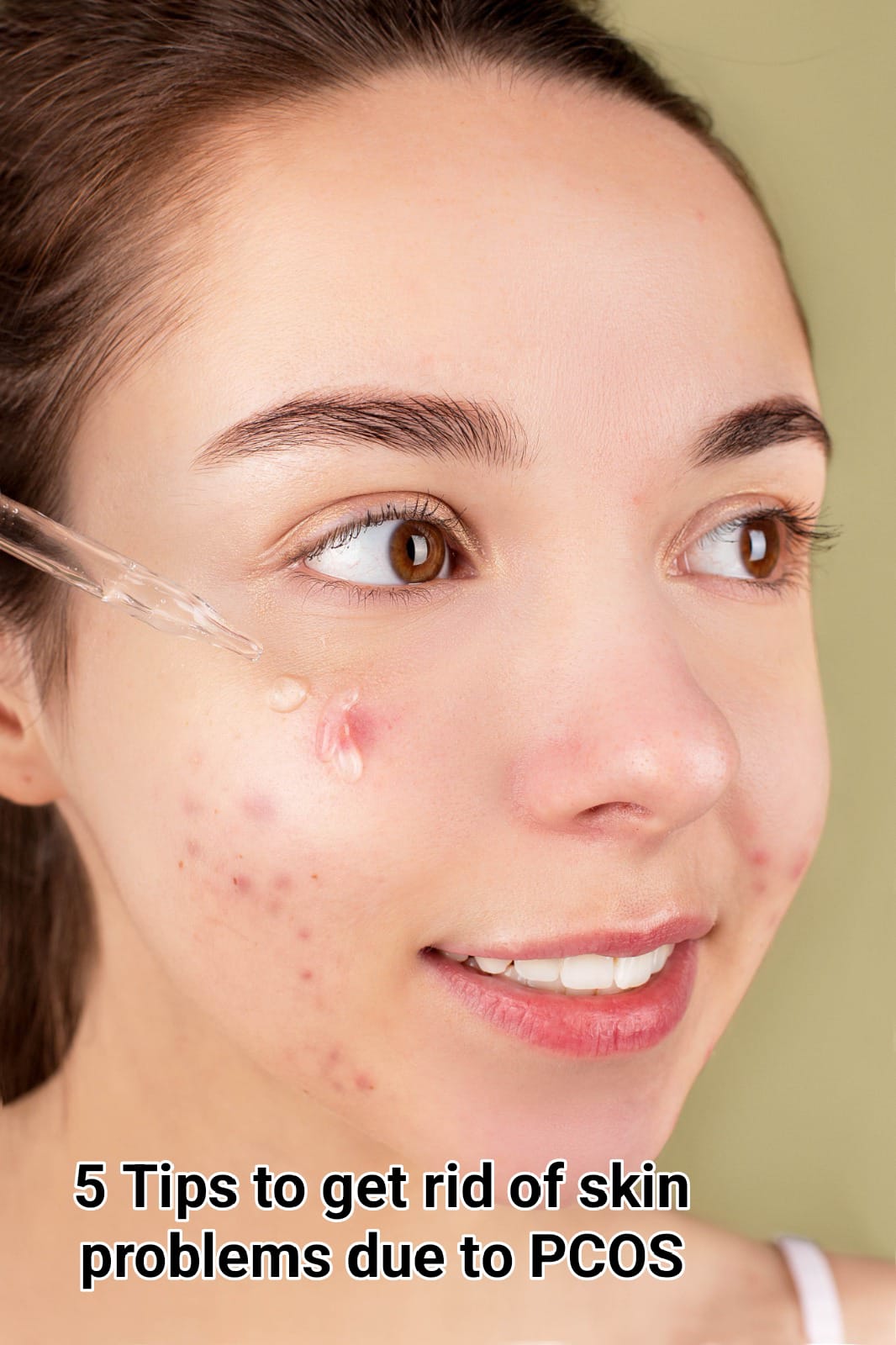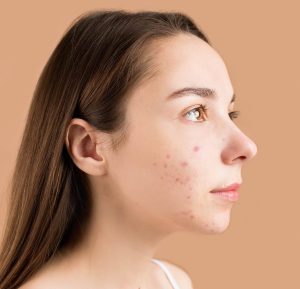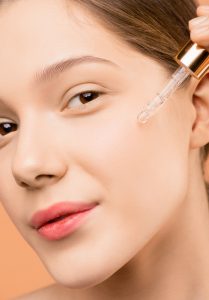
Polycystic ovary syndrome (PCOS) can often lead to various skin problems due to hormonal imbalances. As we already know PCOS is a hormonal disorder which is caused due to hormonal imbalances typically leading to irregular periods, ovarian cysts and often elevated levels of male hormones like testosterone.
What types of skin problems are caused due to PCOS?
The hormonal imbalances associated with PCOS can affect the skin in several ways:
- Acne: PCOS hormonal fluctuations, particularly elevated levels of androgens (male hormones), can result in increased oil production and clogged pores, leading in acne. Acne is frequently concentrated on the face, chest, and back.
- Hirsutism: Excess androgens in PCOS can cause hirsutism, which is the growth of coarse, black hair in areas where women don’t normally have considerable hair growth, such as the face, chest, back, and abdomen.
- Acanthosis Nigricans: Acanthosis Nigricans is a skin ailment that causes dark, thicker patches of skin to form in body folds including the neck, armpits, and groin. Acanthosis nigricans is a symptom of insulin resistance, which is common in people with PCOS.
- Skin Tags: Elevated insulin levels linked to PCOS can result in the formation of tiny, soft skin growths known as skin tags. These are most commonly found in places where skin rubs against flesh or clothing, such as the neck, armpits, and groin.
- Hair Loss: Some women with PCOS may experience hair thinning or loss, which is frequently associated with hormonal imbalances and high androgens.
- Oily Skin: Hormonal abnormalities can increase oil production, resulting in oily skin.
- Irregular pigmentation: Hormonal oscillations can sometimes induce changes in skin pigmentation, resulting in uneven skin tone or darkening of specific areas.
- Mild Eruptions: Some PCOS women may develop small, fluid-filled cysts on their skin, especially in places prone to friction, such as the inner thighs.
How does PCOS cause skin problems?
Hormonal imbalances are one of the reasons for PCOS and these hormonal abnormalities can affect the entire body, including the skin.
PCOS can cause skin problems through a variety of causes, including:
- Increased Androgen Levels: Elevated androgen levels in PCOS patients can result in an overproduction of sebum, the skin’s natural oil. Excess sebum production can clog hair follicles and pores, resulting in acne. Acne in PCOS is more severe and resistant to standard therapies.
- Insulin Resistance: Many patients with PCOS have insulin resistance, a condition in which the body’s cells do not respond well to insulin. Insulin resistance can lead to increased insulin levels in the bloodstream, which can boost the synthesis of androgens even more. Acne and other skin issues can be exacerbated by these androgens.

- Inflammation: PCOS is linked to a state of chronic low-grade inflammation. Inflammatory molecules can harm the skin’s health, causing redness, inflammation, and other problems.
- Hirsutism: Hirsutism is a condition characterized by increased hair growth in regions where males traditionally grow hair, such as the face, chest, and back, caused by excess androgen production in PCOS. This can result in low self-esteem and psychological suffering.
- Acanthosis Nigricans: Insulin resistance in PCOS can also result in a skin condition known as acanthosis nigricans. This disorder is distinguished by dark, thicker, and frequently velvety patches of skin, which are typically present in body folds such as the neck, armpits, and groin.
- Hair loss: Androgenic alopecia, often known as female pattern baldness, is a kind of hair loss caused by an excess of androgen.
5 tips to get rid of the skin problems due to PCOS:
The following five methods can help you manage skin problems caused by PCOS:
- Healthy Diet and Weight Management: Eating a well-balanced diet and maintaining a healthy weight can have a favorable effect on your hormones and general health. Concentrate on eating entire foods including fruits and vegetables, lean meats, whole grains, and healthy fats. Consuming too many refined sugars and processed meals might cause hormone abnormalities.
- Skincare Routine: Establish a mild skincare routine that includes cleaning, moisturizing, and sunscreen application. Look for non-comedogenic skin problem products that are appropriate for your skin type. Avoid using strong chemicals and perfumes that may cause skin problems. A dermatologist can assist you in selecting products that are tailored to the specific needs of your skin.

- Manage Insulin Resistance: Many people with PCOS have insulin resistance, which can lead to skin problems including acne and excessive hair growth. Incorporating complex carbohydrates, fibre, and lean proteins into your diet can aid with blood sugar stabilization.Regular exercise is also important for developing insulin sensitivity. If required, consult your doctor about various drugs or supplements that can help control insulin resistance.
- Stress Management: Excessive stress can exacerbate hormonal imbalances, affecting your skin and leading to various skin problems. To assist in managing stress, practice relaxation techniques such as deep breathing, meditation, yoga, or mindfulness. A good night’s sleep is also important for hormone balance and overall skin health.
- Medical Treatment: Medical intervention may be required in some circumstances to manage skin problems caused by PCOS. Consult a dermatologist as well as an endocrinologist to explore treatment options. Prescription drugs, hormone therapy, or other specialized therapies may be considered depending on the severity of your symptoms.
However in addition to following the above tips to manage the skin problems caused due to PCOS, one can also focus on reversing PCOS naturally and permanently. This can be done by adopting the 5 pillar strategy.
The 5-pillar strategy to reverse PCOS naturally:
- Eat Right: Embrace living, water-rich, whole, plant-based foods that nurture our genetic potential. By opting for local and seasonal choices, we honour nature’s wisdom. Eliminating packaged and processed foods liberates us from epigenetic imprints, elevating our hormonal health.
- Move More: Embark on a journey of holistic lifestyle changes, where staying active transcends mere exercise. Embracing constant movement throughout the day optimizes epigenetic expression, igniting hormonal balance. Engage in pleasurable physical activities, dance, or even mindful walks to unlock the power of epigenetic triggers.
- Breathe Aware: As we deepen our understanding of Pranayama, the science of breath, we access a profound gateway to support gland function and harmonize hormones. Harnessing the breath’s epigenetic influence, we transcend the ordinary and elevate our hormonal well-being.
- Sleep Better: Unlock the secrets of deep sleep, a transformative practice for healing and regeneration. With the art of Yog Nidra, we embrace epigenetic potential, unearthing hormonal harmony in the realm of dreams. Rejuvenate your entire being through this exquisite dance with the epigenetic clock.

- Mind Free: Journey into the realm of emotions, thoughts, and stress resilience, where journaling, gratitude, and emotional practices become our guiding compass. Embracing epigenetic intelligence, we shift our narrative from stress to serenity, empowering our hormonal landscape
Hence by adopting the above 5 pillar strategy, PCOS can be reversed naturally as a result the skin problems and any other problems caused due to PCOS will tend to disappear.






No comment yet, add your voice below!